
by: SEO Strategist
Ashot Nanayan
Ashot Nanayan is the CEO and Founder of DWI and a seasoned SEO strategist. With a proven track record of...
All Articles by Ashot Nanayan
May 3, 2025
8 min. read
Every second client asks me the same question: “Can we rank without backlinks?” My answer is always the same: “That’s like opening a restaurant in the middle of the desert; technically possible, but good luck with that.”
Now seriously, I’ve been in this industry for over six years, and I can assure you that in 95% of cases, it’s not possible to rank in top organic positions without backlinks. That said, there are always exceptions, and today, I want to set the right expectations for anyone with limited patience or budget.
Ready? Stick with me.
Approximately 95% of all pages have zero backlinks, and most of these pages do not rank well in search results.
Only 5% of all websites online have backlinks pointing at them, indicating that the majority of content lacks external links.
The number 1 ranking page on Google has an average of 3.8 times more backlinks than pages ranking in positions 2–10.
According to link-building statistics, 93% of all SEO professionals believe backlinks have the most significant influence on search engine rank compared to any other off-page signal.
As I said, there are definitely situations where it’s kind of possible to rank without backlinks or link-building in general. But nobody really knows how long your rankings will hold those positions.
Before we move forward, it’s important to understand that we’re talking about domain-level backlinks, not page-level. It’s already more than clear that billions of pages without backlinks rank in top positions because of domain authority, while it’s extremely rare to see an entire website with zero backlinks ranking at the top.
So, let’s look at the scenarios where you have a shot.
Yes, it is possible to rank without backlinks, especially when you’re targeting long-tail or so-called “zero-competition” keywords. However, the story behind those keywords is more nuanced than most tools, especially Ahrefs, would have you believe.
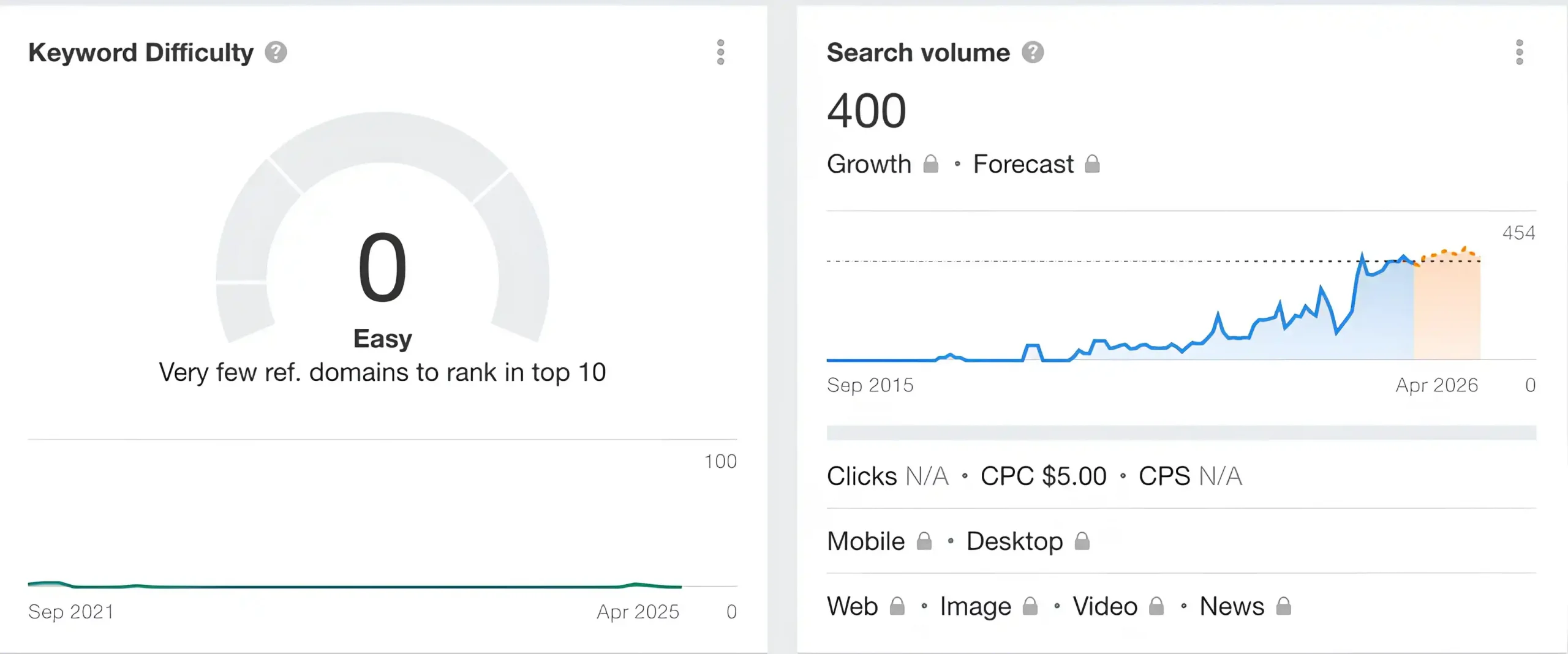
Ahrefs’ Keyword Difficulty (KD) metric isn’t reliable. Not even close. I don’t rely on it to make final calls. Most of the time, when it shows “0 KD,” you’re not dealing with zero competition at all. When you check page two or three, you find sites with tons of backlinks, brand authority, and sometimes even Google’s own properties dominating the top spots.
Look here; most of these websites have a high Ahrefs DR score, which means they’ve got a lot of backlinks.
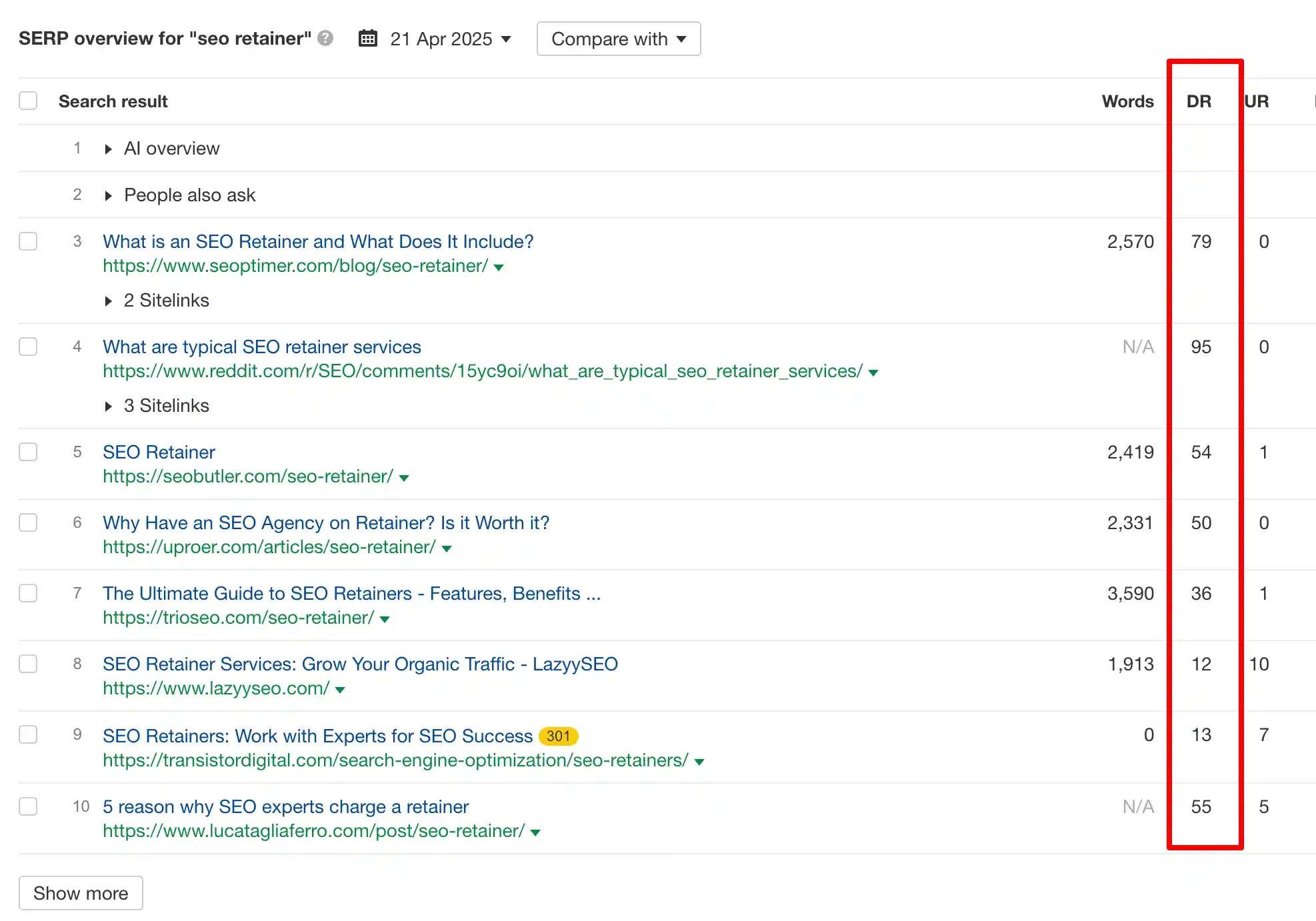
Pages that rank without a single backlink, simply because the keyword was buried deep in the long-tail and had practically no optimized content competing for it. When you publish something helpful and relevant to that specific query, and you align your content structure, intent, and on-page elements, Google can push it up fast. Sometimes even within days.
What works, especially when you’re trying to rank without backlinks, is going deep into very specific niches where most business owners don’t even know what SEO or link-building is.
I’m talking about industries that are still offline-heavy, old-school, or just untouched digitally. When you step into one of these spaces with just basic SEO fundamentals and strong content, it’s like being the only one running in a race.
Here’s a recent example: I work with a client who runs a headstone store. Now, this niche is about as offline and under-optimized as it gets. 99% of their competitors don’t even have meta descriptions, target keywords, SEO-optimized content, or backlinks.
For instance, a few days ago we published a few pieces of helpful content: FAQs, buying guides, memorial tips, and in most cases, the pages started ranking the very next day, as soon as they were indexed.
If you’re interested in exploring similar insights, you can review our detailed link-building case studies for real examples and results.
Another case that stands out is a client in the RF welding machine industry. Super niche. Hyper-technical. Topics like “Robotics trends in RF welding” are very specific. No volume, zero KD, but they’re highly relevant for the right B2B audience.
These pages ranked #1 or #2 consistently, with zero backlinks because no one else could write that kind of content. In that case, the CEO himself was crafting the content, and you could feel the depth and authority in every line.
So yeah, forget the noise. If you’re working in a niche where nobody’s doing SEO, or if you’re publishing insanely specific, technically accurate content that only a subject-matter expert can produce, in most cases, you don’t need backlinks to rank.
In local SEO, backlinks are not always among the top-ranking factors. When it comes to “near me” or proximity-based queries, Google has a different set of priorities, and link equity can take a back seat.
What matters in these cases is location relevance. Google’s local algorithm is driven by proximity, relevance, and prominence. So even if a business has fewer backlinks than its competitors, it can still outrank them simply because it’s closer to the searcher.
I once worked with a local auto repair shop that had almost no backlink profile, barely a handful of citations. But once we optimized their Google Business Profile, implemented some on-page SEO fixes and repurpose their content, they started ranking in the map pack above long-established competitors with thousands of backlinks.
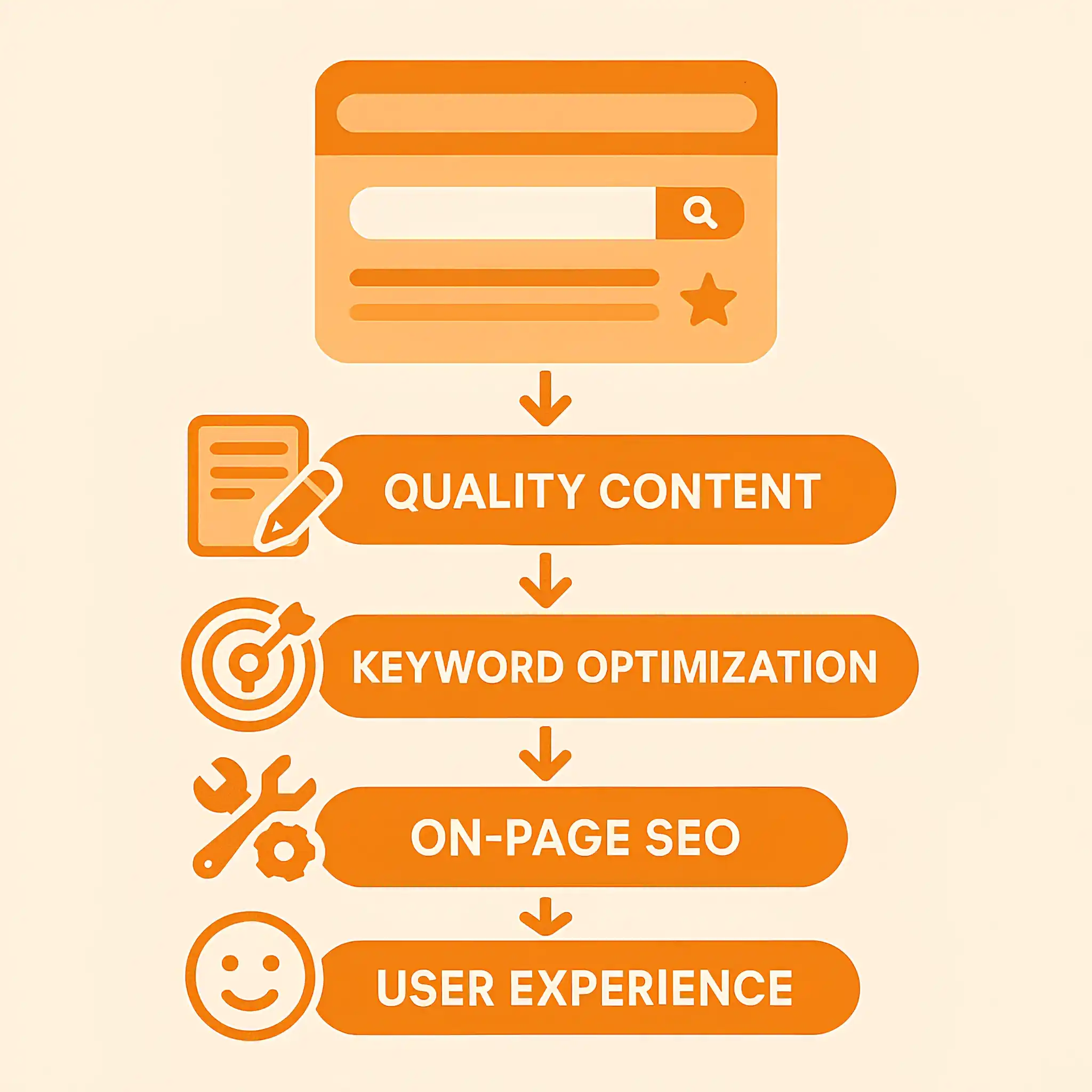
Google recognized that when someone types “car repair near me,” they care about fast service, not who has a link from Forbes.
This doesn’t mean backlinks don’t matter at all in local SEO, but when proximity is involved, local intent can absolutely override traditional link metrics. Google wants to serve the best, most relevant nearby option. Not the most linked one.
Sometimes, being helpful at the right time is enough. Many pages with no links outrank big websites just because they explained something no one else had covered yet.
This happens a lot when a topic is new. If you write about it before others do, and it helps people, Google picks up on that. It doesn’t matter if your site isn’t well-known. If your page answers the question clearly and people stay on it, that’s a strong signal.
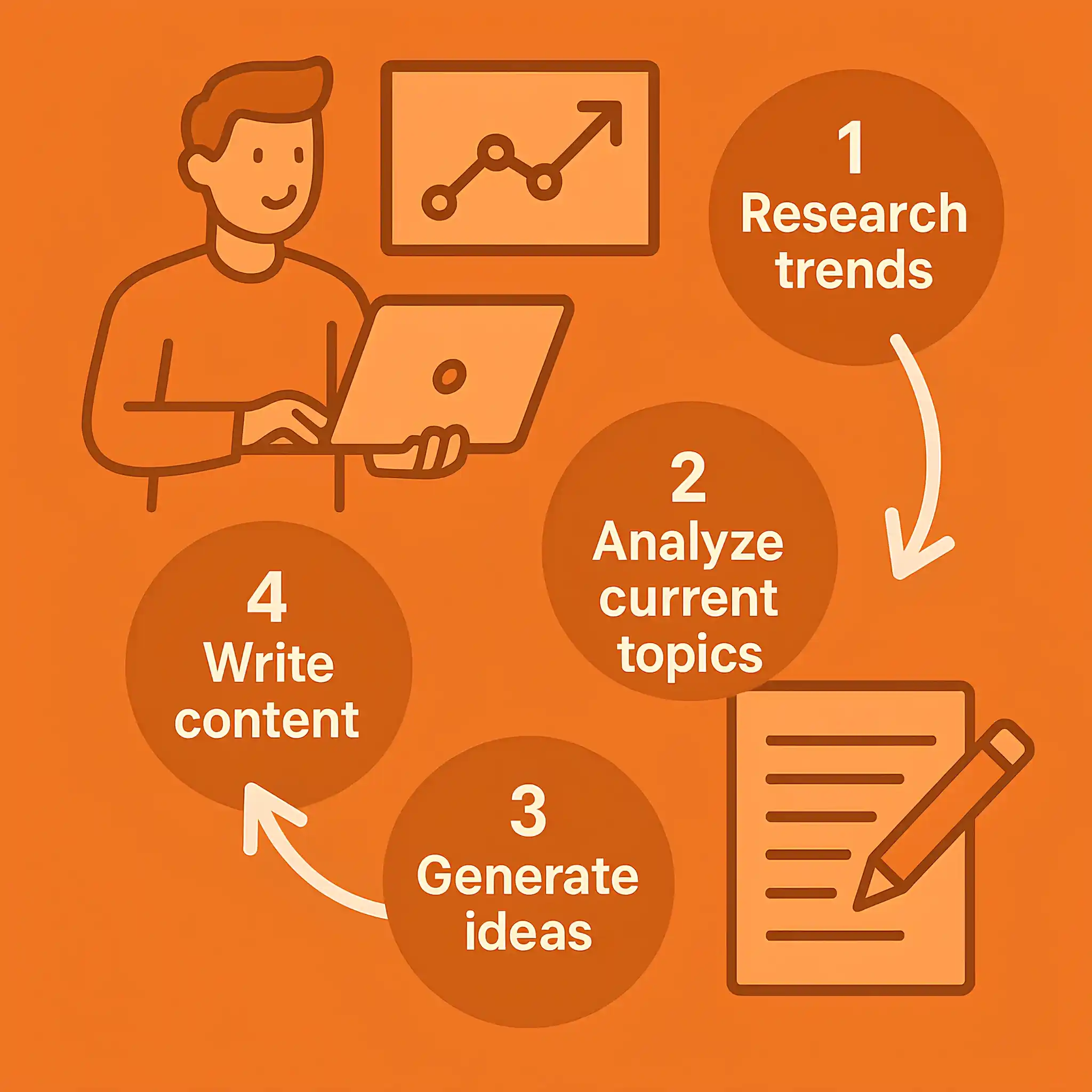
That’s why I always enjoy working with one of my SaaS clients, Michael Baumgartner. He’s great at spotting trends before they go mainstream. He knows exactly where to track updates and how to sense what’s coming. That helps us publish early, stay ahead, and often grab rankings before the competition even realizes what’s happening.
I remember writing about a software feature that had just launched. Almost no one had written about it yet. The post went live, and within days, it appeared near the top of Google.
Now, let’s see when it doesn’t make sense to expect rankings without backlinks. I think the number one scenario is when you’re targeting competitive keywords with commercial or informational intent.
For example, if you’re targeting keywords like “SEO cost” or “SEO Outsourcing,” you’re wasting time if your domain doesn’t have a single link. These aren’t low-hanging fruit; they’re the keywords that make money, and every serious player is covering them.
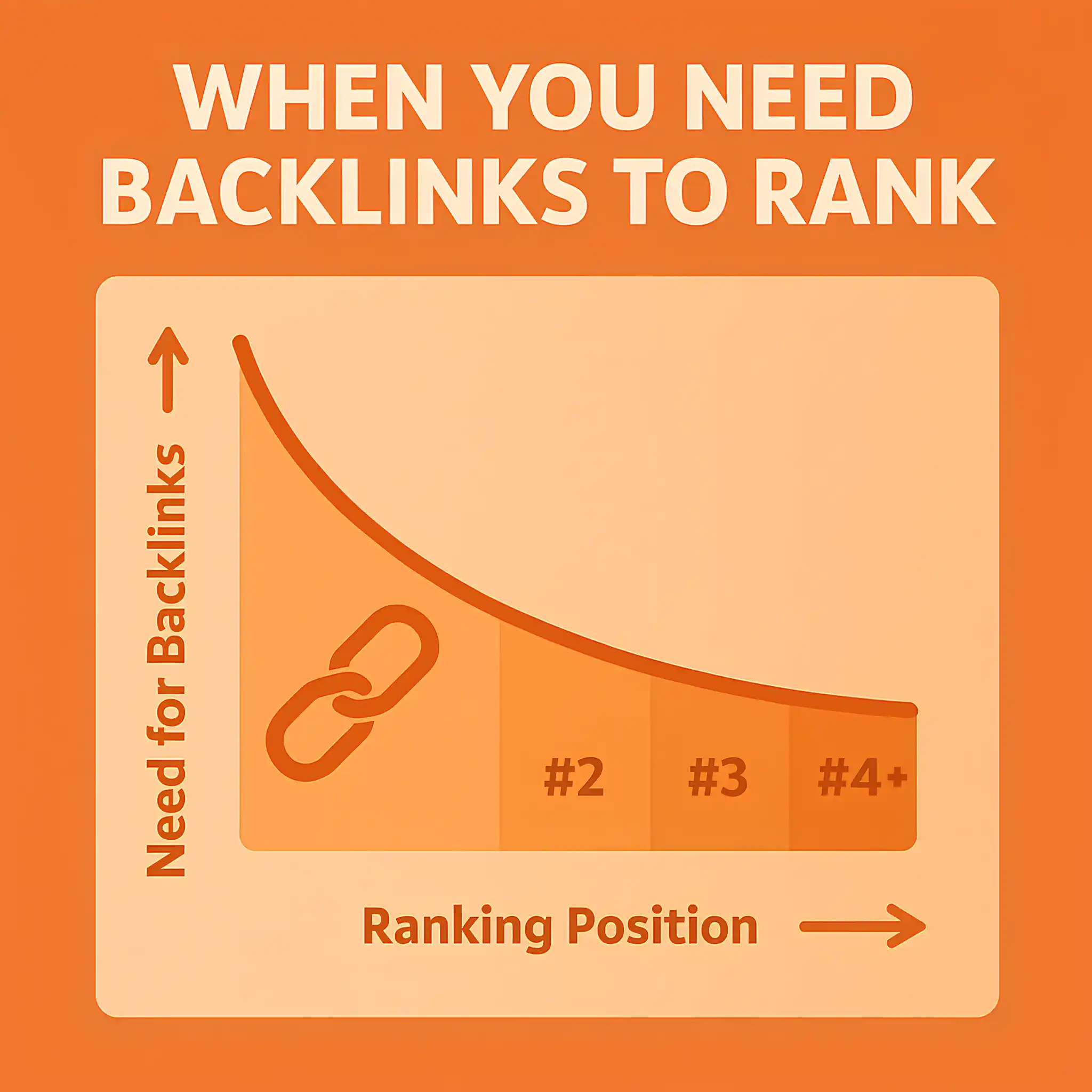
In this case, content quality alone isn’t enough. Google wants signals of authority, and backlinks are the loudest signal in the room. You can write the most comprehensive guide in your niche, but without strong backlinks, you’re invisible.
Another great example is when you’re covering Your Money or Your Life topics; health, finance SEO, legal advice, Google goes full-on protective mode. They want to see experience, expertise, authority, and trust. And while you can build some of that with on-page efforts, backlinks are Google’s favorite way to assess external trust.
Again, if your content is good, and I mean helpful, Google notices. Click-through rate, dwell time, and bounce rate are all signals that show how users interact with your page. If people keep clicking your result, stay on the page, scroll through it, maybe even check out other parts of your site, that is a ranking signal.
Another important factor is internal linking. Google reads your site like a book, and internal links are how you tell it what’s important. When you point several relevant pages toward one high-value piece, Google starts to understand the hierarchy and meaning behind your content.
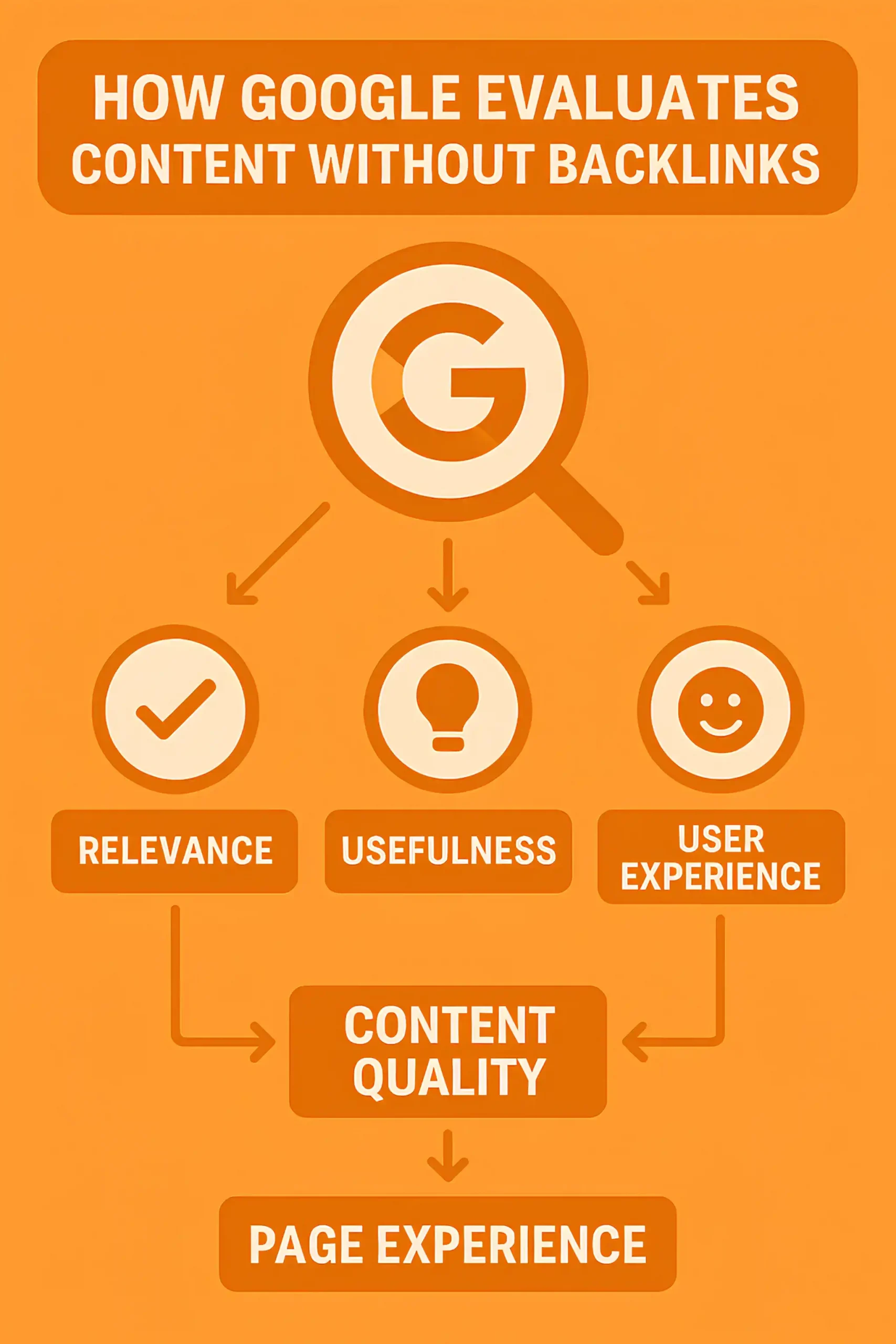
Here is another proven factor: Google doesn’t just want a blog post; it wants a body of work. When you cover a topic deeply from multiple angles, you build topical authority.
One blog post is a drop in the ocean. But 10 interconnected pieces around the same theme is a signal. That’s saying: “We know this topic inside and out.”
I always recommend creating clusters, supporting articles that feed into a main pillar page. Each piece builds relevance and context. When Google sees those internal connections, it strengthens the authority of the whole cluster.
Honestly, without backlinks, sometimes it’s pretty hard to even get indexed because there’s no domain authority. So yeah, ranking without backlinks can take longer, especially if your site’s brand new. For low-competition or niche keywords, you might see results in 1–3 months, assuming your on-page SEO, content depth, and user intent alignment are strong.
However, without external authority signals, Google tends to crawl and index such pages more slowly. Even with great content, you may get stuck in lower positions unless you build topical authority or earn brand trust in other ways.
Content that targets ultra-specific, low-competition, long-tail keywords often performs best without backlinks. This includes how-to guides, niche tutorials, tool reviews, or location-based service pages with very clear search intent.
Google rewards useful, well-structured content that satisfies queries when there’s limited competition. If your page answers a question better than anyone else, and does so with proper structure, keyword use, and UX, it can outrank other pages, even without strong backlink signals.
Social shares don’t pass PageRank like backlinks, but they still play a supporting role. They can help drive traffic, boost content discovery, and improve engagement signals, all of which can support SEO indirectly. If your post gets widely shared, there’s a better chance of earning organic backlinks as more people come across it.
Shares on platforms like Twitter, LinkedIn, or Facebook may also get indexed, especially if they come from authoritative accounts.
Both are important, but context matters. Content quality is the foundation; without it, no amount of backlinks will help long-term. However, backlinks remain one of the strongest off-page ranking signals, especially in competitive niches. If your content is truly valuable but no one links to it, Google may struggle to assess its authority.
That said, great content often earns backlinks naturally over time. For newer sites or those targeting informational queries, content quality might carry more initial weight. But for competitive commercial keywords, backlinks often become the deciding factor once content quality is equal.
Nofollow links don’t directly pass link equity, but they still offer indirect SEO value. Google may use them for discovery, especially when they come from reputable sources.
Yes, brand mentions, even without clickable links, can contribute to your overall authority. Google has evolved to understand entities, not just URLs. If your brand is frequently mentioned in niche-relevant contexts, it helps Google connect the dots.
Yes, they can. If users frequently search for your brand name or domain directly (e.g., “Digital World Institute SEO”), it sends a strong signal to Google about brand relevance and user trust. It shows demand. So while navigational queries don’t pass link equity, they do influence ranking patterns, particularly for brand-heavy SERPs.